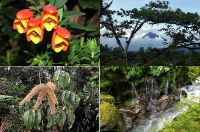Training course in Tropical Field Botany
 [2]
[2]
Course Description
The Missouri Botanical Garden [3](MBG), the New York Botanical Garden [4] (NYBG), and the Universidad Estatal Amazónica [5] (UEA) are pleased to announce a 3-week training program in Tropical Field Botany in Ecuador for highly motivated early graduate students from American universities who are interested in pursuing a career in Plant Systematics. Scientists from MBG, NYBG, and UEA will offer a broad introduction to the topics of tropical field botany and plant taxonomy through a variety of experiences, including classroom lectures, discussion sessions, and fieldwork. Drawing from the instructors’ personal research experiences, students will learn about the tools and methods used to understand and conduct research on Tropical Botany and the related topic of plant conservation.
Where
The first part of the course will be held mainly at the Universidad Estatal Amazonica’s CIPCA research station, located in the Amazonian Region near Santa Clara, Pastaza province, Ecuador. Field trips will be scheduled in nearby natural areas in the Pastaza region. The second part of the course will include field trips in the Andes Mountains in southern Ecuador, in Loja and Zamora-Chinchipe Provinces, near the Podocarpus National Park.
Support
The program will provide financial support to cover lodging and meals, course materials, and travel costs between USA and Quito, as well as local transportation during the course. The program is funded by the National Science Foundation [6] (NSF), with support from MBG, NYBG, and UEA.
Requirements
Participants will be expected to:
-
Have a valid passport to travel to Ecuador;
-
Participate in all aspects of the training, including discussions, laboratory, and fieldwork;
-
Willingness and ability to walk up to 10 km on mountain trails and to work as part of a team in adverse field conditions (e.g., hot, rainy, cold, etc.);
-
Develop and present a 15-minute scientific presentation at the end of the program.
Application Deadline
October 1st, 2018. More detailed information is available here [7]. Further information can be obtained from the program coordinator: Dr. Marcela Mora (marcela.mora@mobot.org [8]).